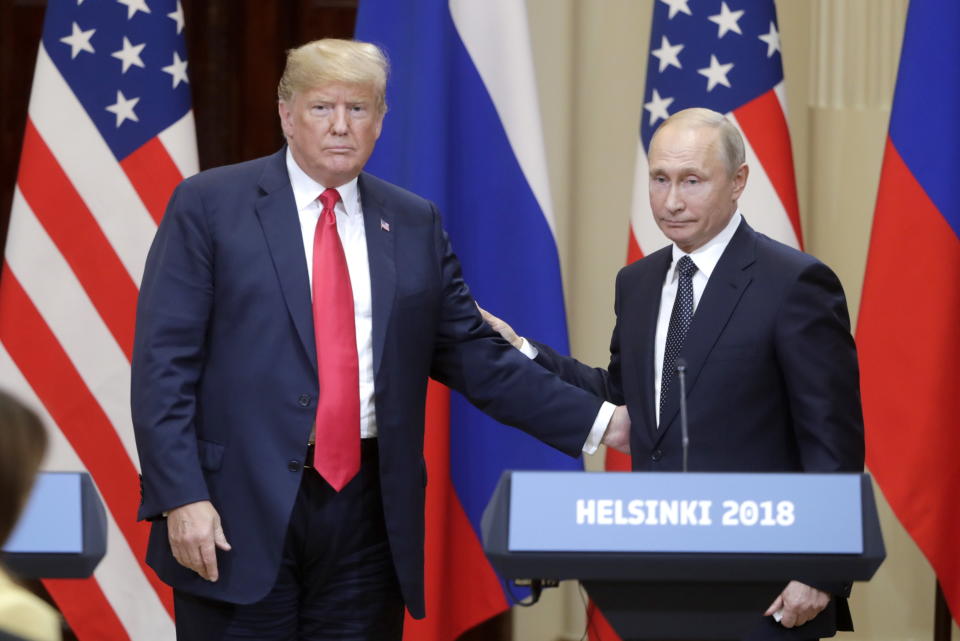Trump and Putin: The admiration is mutual, the benefits one-sided
During the 2016 presidential campaign, 122 Republican foreign policy experts denounced the campaign of Republican candidate Donald Trump in an unsparing open letter declaring that his “vision of American influence and power in the world is wildly inconsistent and unmoored in principle.” Among the charges listed by the signers, many of whom were seasoned cold warriors, was that Trump’s “admiration for foreign dictators such as Vladimir Putin is unacceptable for the leader of the world’s greatest democracy.”
Those fears appear to have been confirmed on Monday afternoon, during the joint press conference President Trump held with Russian leader Putin, after the two met privately for about two hours in Helsinki. Afterward, Sen. John McCain, R-Ariz., called it “one of the most disgraceful performances by an American president in memory,” while Jeff Flake, the junior Republican U.S. senator from the same state, called what he saw as Trump’s pandering to Russia “shameful.”

It was the first substantial bilateral summit between the two leaders, who have shown signs of mutual admiration, if little of the international cooperation that affinity was supposed to produce. Trump did not head into the meeting with clear-cut geopolitical goals, nor with any specific demands he planned to make of Russia. Russia welcomed the overture, but did not indicate it would make any substantive concessions.
During the extraordinary press conference, Trump praised Putin as a “good competitor,” just days after denouncing the European Union as a “foe.” He blamed the strained relationship between Russia and the United States on a variety of forces, including Democrats “who want to resist and obstruct,” ignoring the complexity of the post-Soviet relationship, which has proved intractable to Democrats and Republicans alike. “We have taken the first steps towards a brighter future,” Trump said in his remarks, though it was unclear what those steps were, beyond unspecific and perhaps unworkable promises to cooperate on terrorism and the crisis in Syria.
Trump has long pursued a personal relationship with Putin, for reasons that have frequently seemed more personal than political. Putin, for his part, craves the legitimacy of standing next to an American president — a signal to the rest of the international community of Russia’s renewed role as a global power. Both men got what they wanted on Monday, though Trump arguably gave away far more to meet the Russian president in Helsinki.
That point was made clear near the end of the press conference, when Associated Press reporter Jonathan Lemire asked Trump if he believed the American intelligence community, which has found that Russia interfered in the 2016 American presidential election, or if he found credible Putin’s assertions that no such interference took place.
“I don’t see any reason why it would be” Russia, Trump said, effectively discrediting his own spy chiefs, including most notably then-CIA Director Mike Pompeo and Director of National Intelligence Dan Coats. He then proceeded to discuss a variety of conspiracy theories regarding the hacking of the Democratic National Committee and the Clinton campaign. Those theories have found great traction on Fox News, the president’s primary source of news and political insight. They have otherwise been debunked.
Putin, meanwhile, was given a platform to appear the elder statesman. Discussing the charges that the Kremlin attempted to influence the election in Trump’s favor, he said, “I believe that Russia is a democratic state, and I hope you are not denying this right to your own country. Do you believe the USA is a democracy?” If Putin, who has presided over Russia as a kleptocracy for nearly two decades, believes his country is a democracy, he hasn’t fooled the rest of the world. Putin also seemed to suggest that the American election may have been compromised by George Soros, the billionaire Hungarian-American financier. Soros, who is Jewish, is a favorite target of far-right elements in both Europe and the United States.
There were other, more subtle hints that Putin isn’t budging on the most pressing issues plaguing the two nations. He referred to his 2014 invasion and annexation of Crimea as the “internal Ukrainian crisis.” Putin also called for “crushing terrorists” in southwestern Syria, where rebels fighting the Russian-backed regime of Bashar Assad have some of their last strongholds. Trump launched airstrikes against Assad in 2017.
But if these were warning signs of how treacherous the U.S. relationship with Russia remains, Trump appears to have missed them, so eager was he to highlight his newfound friendship with Putin. “Our militaries do get along,” he said, though earlier this year U.S. forces killed several hundred Russian fighters in Syria. Russia is unlikely to have forgotten that provocation.
Trump, of course, is not the first president to seek better relations with Russia. George W. Bush famously looked into Putin’s soul and saw decency there, whereas Obama sought a “reset” with the Russian president. Both overtures ultimately came to naught. Trump has courted Russia far more assiduously than either of his predecessors, while insisting he has actually been (his favorite word) “tougher.” What he will have to show for it, other than the memory of a handshake in Helsinki, remains far from clear.
_____
More coverage of the Trump-Putin summit from Yahoo News:


